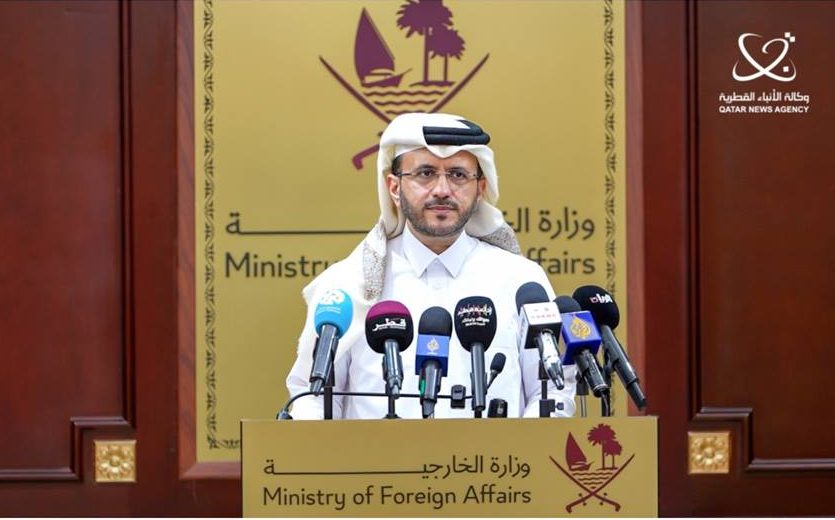The talks in Doha have been taking place for 10 days, where negotiators from Qatar, Egypt and the United States have been attempting to bridge the gaps between Israel and Hamas.
Talks aimed at reaching a ceasefire in Gaza and a captives release deal are ongoing in Doha, Qatar’s Foreign Ministry spokesperson Majed Al Ansari said on Tuesday, dismissing claims that the negotiations ended.
Al Ansari’s remarks came during a weekly press briefing in Doha, where the journalists’ questions focused on the latest status of the ceasefire talks. The briefing also came as reports pointed to the departure of the Israeli delegation from Qatar and the talks reached a dead-end.
The Qatari official noted “that the meetings are in full swing and have not been interrupted,” adding that the entry and exit of delegations is normal. He said that the negotiation process involves the constant exchange of new ideas and responses.
The talks in Doha have been taking place for 10 days, where negotiators from Qatar, Egypt and the United States have been attempting to bridge the gaps between Israel and Hamas.
The proposals have centred around a six-week truce in Gaza that would ultimately pave the way for a ceasefire.
Hamas has long rejected any deal that does not involve a complete ceasefire in Gaza, where Israel has relentlessly killed more than 32,414 Palestinians. Israel has cited its goal to eliminate Hamas as the reason behind its refusal to withdraw its troops and end the war.
On Tuesday, the office of Israel’s Prime Minister Benjamin Netanyahu said Tel Aviv “will not address Hamas’ delusional demands,” while blaming the group for the delay in reaching a deal.
“Israel will pursue and achieve its just war objectives: Destroying Hamas’s military and governmental capacities, release of all the hostages, and ensuring Gaza will not pose a threat to the people of Israel in the future,” the statement said.
Netanyahu also blamed the United Nations Security Council’s Monday vote for a ceasefire resolution.
“Hamas’ stance clearly demonstrates its utter disinterest in a negotiated deal and attests to the damage done by the UN Security Council’s resolution,” the statement added.
The statement was met with outrage from Washington amid an apparent widening rift between Netanyahu and U.S. President Joe Biden. Tensions were already high before the UNSC vote as Netanyahu threatened to not send a delegation to Washington if the U.S. does not use its veto power.
The U.S., which vetoed three previous resolutions, abstained from voting.
“Hamas’ response was prepared before the UN vote even took place. We will not play politics with this most important and difficult issue, and we will remain focused on a deal to free the remaining hostages,” a U.S. official told Axios on Tuesday.
Top Israeli military official Yoav Gallant also visited the U.S. where he met Secretary of Defense Lloyd Austin and CIA director Bill Burns. Notably, Burns was reportedly in Doha over the weekend in hopes of breaking the stalemate in the talks.
Qatar welcomed the adoption of the UNSC resolution on Monday, saying it hoped it would pave the way for a permanent halt to the war in Gaza “especially in light of the catastrophic humanitarian conditions.”
“The Ministry of Foreign Affairs stresses the need to comply with the implementation of the resolution, especially stopping the hostilities, facilitating the urgent and unhindered entry of humanitarian aid to all areas of the Strip, and positively engaging in the ongoing negotiations,” the Qatari statement read.
When asked whether the UNSC vote will affect the talks, the Qatari foreign ministry spokesperson said that international diplomatic efforts are complementary to each other. He added that the resolution represents a tool for diplomatic pressure.
UNSC resolutions are binding on all member states and a reflection of international law. However, Israel has long acted with impunity in violation of all international laws and charters.
This has become more evident with the harrowing crimes Israel carried out on the ground despite the International Court of Justice’s provisional measures of January 26.
The ICJ’s interim ruling at the time was in response to South Africa’s case accusing Israel of committing genocide in Gaza, which it had submitted on December 29, 2023.
South Africa’s claim pointed to Israel’s violation of the 1948 Convention on the Prevention and Punishment of the Crime of Genocide, though the court fell short of ordering a ceasefire in Gaza.







